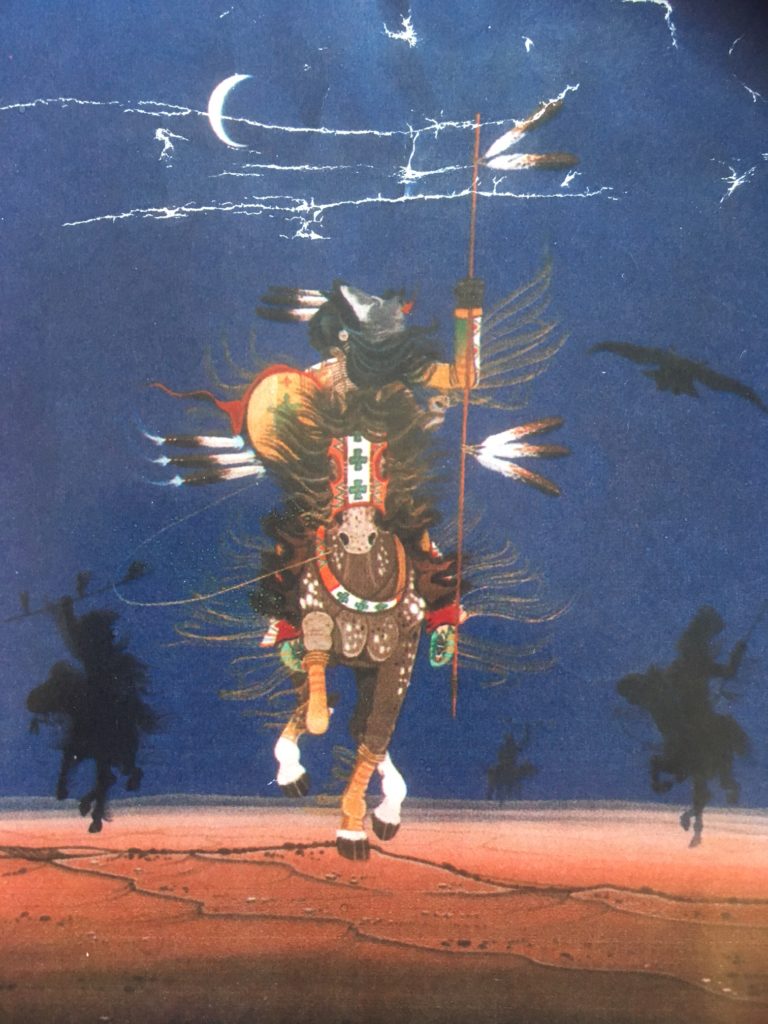Earlier this month, I met a man on the street who called himself “Buckskin.” He asked me for money so he could eat, so I took him to a local coffee shop for a sandwich and a soda. On the way there, Buckskin told me part of his story. He said he was a member of the Northern Cheyenne nation, and came from Montana to Colorado to sell his artwork. I didn’t ask how he ended up without a place to stay, and he didn’t offer a reason why.
Due to Buckskin’s non-conventional behavior — he made what seemed to me an innocent, but socially unacceptable comment to a female employee — he was more or less asked to leave the shop, and a manager, assuming I was Buckskin’s case manager, chastised me for his behavior. We did leave, and ended up eating outside, which was fine because it was a nice day. As I was leaving, he gave me a weathered copy of one of his postcard drawings and said I could share it with my friends. Here it is:

I’m still reflecting on that experience — on the reaction of others to Buckskin and my own reaction to him and on the way things work in our society. That’s pretty much the theme of this month’s “resources” post — how and why do things work the way they do and how can they change?
- Discipline and Punish: The Birth of the Prison by Michel Foucault — Last month, I recommended the documentary 13th, and in keeping with that theme, I’ve revisited Discipline and Punish, a classic on law and order from a postmodern perspective.
- Faithful Disagreement: Wrestling With the Scripture in the Midst of Church Conflict by Frances Taylor Gench — A timely work that examines our tendency to demonize political or religious opponents. Gench was a member of a 20-member task force in the PCUSA denomination that came to acknowledge their own contributions to current conflicts in a unanimous 2006 report, “A Season of Discernment.” Here’s an excerpt of a quote from Martin Marty on how denominations should deal with conflicts over sexuality, “Well, first, we need to stop voting on all of these issues, and rid ourselves of the fiction that majority rule in a 55-45 split reflects the will of God. And then we need to start practicing a new kind of polity, one rooted in conversation and hospitality.”
- Paul Was Not a Christian: The Original Message of a Misunderstood Apostle by Pamela Eisenbaum — A provocative title and persuasive read from a Jewish professor of New Testament at Iliff Seminary. Gives more credence in my eyes to a diverse movement among scholars called the “New Perspective on Paul.”
- God of the Oppressed by James H. Cone — A landmark in American liberation theology.
- The Battle of Sand Creek by Morse H. Coffin — A short testimony regarding the Colorado War of 1864 and what the author termed the “fight” at Sand Creek.
- Memories of a Lifetime in the Pike’s Peak Region by Irving Howbert — Another, more exhaustive memoir by an early Coloradoan, that deals with the massacre at Sand Creek.


